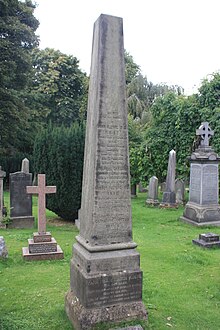John Fleming (zoologist)
John Fleming (born January 10, 1785 in Bathgate , Linlithgowshire , Scotland , † November 18, 1857 in Edinburgh ) was a Scottish zoologist ( malacologist ), botanist and geologist. Its official botanical author abbreviation is " Fleming ".
Live and act
Fleming graduated from Edinburgh University in 1805 . He was pastor of the Church of Scotland and was ordained in 1808. He then held various parish positions in Scotland until 1834 when he became professor of natural philosophy at King's College, University of Aberdeen. In 1845 he became professor of natural history at New College in Edinburgh. In 1814 he received his doctorate in theology from the University of St. Andrews (Doctor of Divinity, DD).
He was the first to discover fossil remains of fish in the old red sandstone in the Scottish region of Fife in 1831 . He was also the author of The Philosophy of Zoology (1822) and A History of British Animals (1828). In it he took the view that fossil animals would have become extinct due to climate change. He also wrote Insecta. In: Supplement to the fourth, fifth and sixth editions of the Encyclopae-dia Britannica, with preliminary dissertations on the history of the sciences (1821). Throughout his life he was also interested in theology and tried to combine religious assumptions, such as the Flood, with scientific facts. He was involved with William Buckland in a dispute about the role of the Flood in mass extinction or in the formation of landscapes. According to Fleming, according to the Bible, the Flood was not a sudden catastrophe, but rather happened gradually.
He was a Fellow of the Royal Society (1813) and the Royal Society of Edinburgh (1814). With Robert Jameson he founded the Wernerian Society in Edinburgh in 1808.
He named some taxa of molluscs (such as Conoidea ).
Fonts
- The Philosophy of Zoology; or A General View of the Structure, Functions, and Classification of Animals. 2 volumes. A. Constable et al., Edinburgh et al. 1822, digitized volume 1 , digitized volume 2 .
- Insecta. In: Supplement to the fourth, fifth and sixth editions of the Encyclopædia Britannica. With preliminary dissertations on the history of the sciences. Volume 5. A. Constable et al., Edinburgh et al. 1824, pp. 41-56, digitized .
- A History of British animals, exhibiting the descriptive characters and systematical arrangement of the genera and species of quadrupeds, birds, reptiles, fishes, mollusca, and radiata of the United Kingdom; including the indigenous, extirpated, and extinct kinds, together with periodical and occasional visitantsm. Bell & Bradfute et al., Edinburgh et al. 1828, digitized .
- The Temperature of the Seasons, and Its Influence on Inorganic Objects, and on Plants and Animals. Johnstone & Hunter, London et al. 1851, digitized .
- Molluscous animals, including shell fish; containing an exposure of their structure, systematical arrangement, physical distribution and diatetical uses; with a reference to the extinct races. Forming the article "Mollusca" in the 7th ed. Of the Encyclopædia britannica. Black, Edinburgh 1837, digitized .
literature
- DT Moore: John Fleming. In: Oxford Dictionary of National Biography . 2004.
- Philip F. Rehbock: John Fleming (1785-1857) and the economy of nature. In: Alwyne Wheeler, James H. Price (Eds.): From Linnaeus to Darwin. Commentaries on the History of Biology and Geology. Papers from the fifth Easter Meeting of the Society for the History of Natural History 28-31 March, 1983 "Natural History in the early Nineteenth Century" (= Society for the History of Natural History. Special Publication. No. 3). Society for the History of Natural History, London 1985, ISBN 0-901843-07-5 , pp. 129-140.
- Leroy Page: John Fleming. In: Dictionary of Scientific Biography .
- Leroy Page: Diluvialism and its critics in Great Britain in the early nineteenth century. In: Cecil J. Schneer (Ed.): Toward a History of Geology. Proceedings of the New Hampshire Inter-Disciplinary Conference on the History of Geology, September 7-12, 1967. MIT Press, Cambridge MA et al. 1969, ISBN 0-262-19058-3 , pp. 267-271.
- Leroy Earl Page: The rise of the diluvial theory in British geological thought. 1963, pp. 146-150 (Norman OK, University of Oklahoma, Dissertation, 1963).
- Charles Coulston Gillispie : Genesis and Geology. A Study in the Relations of Scientific Thought, Natural Theology, and Social Opinion in Great Britain, 1790-1850 (= Harvard Historical Studies. 58, ISSN 0073-053X ). Harvard University Press, Cambridge MA 1951.
Web links
References and comments
- ↑ John Fleming: The Geological Deluge, as interpreted by Baron Cuvier and Professor Buckland, inconsistent with the testimony of Moses and the Phenomena of Nature. In: The Edinburgh Philosophical Journal. Vol. 14, No. 28, 1826, ZDB -ID 218162-9 , pp. 205-239, here p. 208, digitized .
| personal data | |
|---|---|
| SURNAME | Fleming, John |
| BRIEF DESCRIPTION | Scottish zoologist and geologist |
| DATE OF BIRTH | January 10, 1785 |
| PLACE OF BIRTH | Bathgate , Linlithgowshire , Scotland |
| DATE OF DEATH | November 18, 1857 |
| Place of death | Edinburgh |
